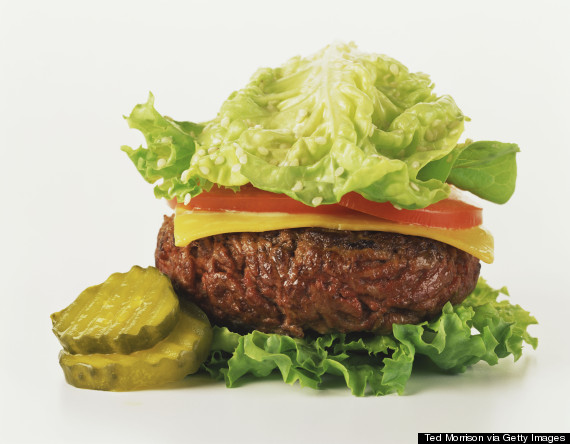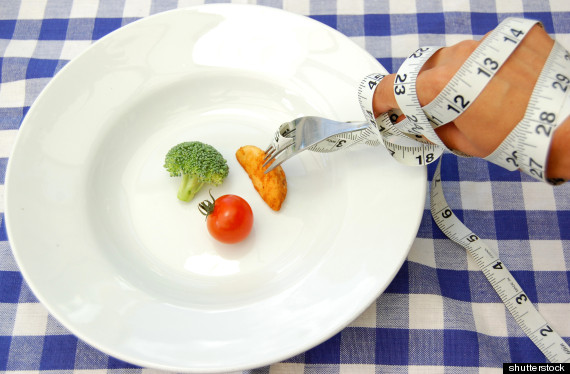By Corrie Pikul
They're not only ineffective in the long term, but they often have unexpected health consequences.
The Week of Magical Fasting: Diets Made Up of Just One (Very Healthy) Thing 
The method: For several days in a row, you eat nothing but the one food (cabbage soup, grapefruit), food group (raw vegetables and fruit) or type of food (juice).
The promise: You'll drop pounds fast, kick-starting a long-term healthy-eating plan; you'll reset your metabolism; you'll clear out the "toxins," fats and other nasty things that are glomming you up.
The problem: When you eat only one kind of food, you fail to eat all the other kinds, so you miss out on protein, fats, fiber and other essential vitamins and nutrients.
The risks: After a few days, your calorie-starved body may break down muscle mass for energy. This can throw off your metabolism and make future calories (i.e., the ones you'll consume after the fast) harder to burn off. Consuming massive quantities of the foods that make up these diets—vegetables, fruit—can lead to uncomfortable bloating as well as severe diarrhea[1] . Further, what are leaving your body aren't "toxins" (your body naturally flushes out excess nutrients, as well as chemical substances) but the effluvia of an out-of-whack gastrointestinal system that's both overloaded with water, simple carbs[2] and fructose, and deprived of solid matter.
What's more, says Lisa Sasson, a registered dietician and a clinical associate professor of nutrition and food studies at New York University, for those who already have an unstable relationship with food, this kind of fasting usually leads to obsessive thoughts. ("At the end of this juice rainbow is a nice, rare steak. And curly fries.") Let's be clear: No nutritionist is going to rip a beet-apple tonic, cup of veggie soup or kale salad out of your hands. But most would also agree that a week's worth of these foods (in the absence of any others) is an impractical way to lose weight. (By the way, if you really want to "cleanse," Sasson suggests eating more whole grains and high-fiber foods, which act like a natural scrub brush to clear out the intestines.)
The Diet with the Backwards Ratios: High Protein, Low Carb 
The method: Eat protein[3] , and lots of it. Also known as: Bring on the double bison burgers[4] (without the bun).
The promise: You'll burn more calories by digesting protein, and, because protein takes a while to leave your stomach, you also feel fuller longer.
The problem: By consuming 30 to 50 percent of your calories in bacon, eggs or even tofu, you won't get the carbohydrates[5] you need. Yes, carbs are often maligned for their almost addictive pull and simple white carbs have been linked to weight gain, diabetes, inflammation and heart disease. But this food group remains the most efficient fuel source for the body, explains Sasson (who is, by the way, a fan of lean protein). Carbs are crucial for tissues and organs like the brain and the heart. If you don't supply your body with adequate amounts of carbohydrates, it's forced to use energy from muscle as well as fat.
The risks: Breaking down too much muscle and fat for fuel can lead to the production of ketones, which can cause nausea, bad breath, headaches, muscle soreness and, over time, kidney stones, gout and even kidney failure. Other potential unpleasant side effects include constipation (from a fiber deficit), intense fatigue and weak bones (animal protein can increase blood acidity, leading your body to use its calcium to neutralize it). So even though high-protein, low-carb diets are preferred by some fitness buffs, the American Heart Association specifically advises against them.
The Strategy That Claims to Lengthen Your Life as It Shrinks Your Body: Calorie Restriction
 [6] [7]
[6] [7]
The method: Eating 20-to-25 percent fewer calories than your body needs to function. (Using the FDA's general recommendation of 2,000 daily calories[8] , a person on this type of diet would consume only 1,500 to 1,600.)
The promise: You can lower the risk of your getting heart disease and improve your cardiovascular function—all while slimming down.
The problem: When you drastically cut calories, your body adapts by learning how to do more with less. It lowers your metabolic rate, holds on desperately to fat stores and takes longer to execute basic functions like breathing; it literally slows down to survive, says Sasson. There's a hotly debated theory that this adaptive response also slows the aging process. But, while initial research on the link between cutting calories and adding years seemed encouraging[9] , the latest studies are much less convincing. (For now, the jury is still out[10] .)
The risks: Eating just a little bit more than your strict low-calorie usual (say, during a stressful business trip) makes you more likely to put on pounds—and, worse, it's tougher to get rid of them. You're also at a higher risk of losing muscle and bone mass (and testosterone, if you're male). And unless you're following this eating plan under the close supervision of a doctor, Sasson says, you will likely end up deficient in essential nutrients.
References
- ^ lead to uncomfortable bloating as well as severe diarrhea (www.cancer.org)
- ^ simple carbs (www.nlm.nih.gov)
- ^ Eat protein (www.atkins.com)
- ^ double bison burgers (thepaleodiet.com)
- ^ carbohydrates (www.hsph.harvard.edu)
- ^ ketones (www.webmd.com)
- ^ American Heart Association specifically advises against them (www.heart.org)
- ^ Using the FDA's general recommendation of 2,000 daily calories (www.fda.gov)
- ^ link between cutting calories and adding years seemed encouraging (www.cnn.com)
- ^ the jury is still out (healthland.time.com)
- ^ Send us a tip (www.huffingtonpost.com)
- ^ Send us a photo or video (www.huffingtonpost.com)
- ^ Suggest a correction (www.huffingtonpost.com)

No comments :
Post a Comment